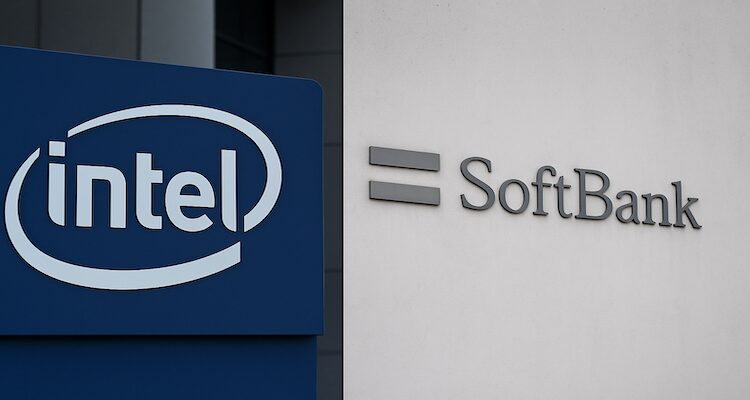Intel Secures $2B From SoftBank in Crucial Bid to Revive Chip Dominance

Intel gains a $2B lifeline from SoftBank, strengthening its turnaround efforts as it battles rivals AMD and TSMC to reclaim chip industry dominance.
A Lifeline for Intel
In a major show of confidence, Japan’s SoftBank Group is investing $2 billion into Intel, giving the struggling U.S. chipmaker a much-needed financial boost as it navigates a difficult turnaround. The move makes SoftBank one of Intel’s top ten shareholders and underscores the Japanese firm’s aggressive push into semiconductors and artificial intelligence.
The equity deal, announced Monday, comes at a pivotal moment for Intel. Once considered the backbone of the global chip industry, the company has been weakened by years of mismanagement and its failure to secure a dominant position in the booming AI processor market.
SoftBank’s Strategic Bet
The $2 billion investment will be made through a primary stock issuance at $23 per share, slightly below Intel’s Monday closing price of $23.66. Based on Intel’s market valuation, the deal translates into a stake of just under 2%, positioning SoftBank as the sixth-largest Intel shareholder, according to LSEG data.
For SoftBank, this move adds to its high-stakes portfolio, which includes a $500 billion Stargate U.S. datacenter project and recent multibillion-dollar commitments in AI ventures such as OpenAI. However, unlike other large-scale partnerships, SoftBank will not seek a board seat at Intel nor tie itself to purchasing Intel’s chips, according to sources familiar with the transaction.
Government Interest and Political Undercurrents
SoftBank’s investment coincides with reports that the U.S. government is considering taking up to a 10% stake in Intel to help stabilize domestic chip production. Treasury Secretary Scott Bessent clarified that any government involvement would be designed to support Intel’s manufacturing capacity not to force adoption of its chips.
The speculation follows a meeting between Intel’s newly appointed CEO, Lip-Bu Tan, and President Donald Trump, who had reportedly pressed for Tan’s resignation over his past ties to Chinese firms. While Tokyo’s recently announced $550 billion U.S. investment package sparked speculation that SoftBank’s deal was politically aligned, Japanese government officials said this Intel stake is not part of that broader package.
SoftBank CEO Masayoshi Son dismissed any direct political connection, stating instead that the decision reflects confidence in Intel’s future role in U.S. semiconductor manufacturing. “We believe advanced semiconductor production will continue to grow in the United States, and Intel is central to that future,” Son said.
Intel’s Mounting Challenges
Intel’s uphill battle is steep. The company reported a staggering $18.8 billion annual loss in 2024 its first loss since 1986 as rivals eroded its dominance. AMD has steadily eaten into Intel’s market share in both personal computer and server chips, while Taiwan’s TSMC has cemented itself as the global leader in contract chip manufacturing.
Intel’s own foray into the foundry business has yet to gain traction, despite billions invested. Few customers have signed on, forcing the company to consider restructuring its manufacturing division in pursuit of bigger clients.
Industry analysts remain skeptical that SoftBank’s cash alone will change Intel’s fortunes. “This investment is symbolic support, not a game-changer,” said Amir Anvarzadeh, Japan equity strategist at Asymmetric Advisors. “It does help keep ties with U.S. leadership strong, particularly under Trump.”
Market Reaction
Markets responded swiftly to the news. Intel’s stock surged more than 7% on Tuesday following the announcement, while SoftBank shares dropped 4% a signal that investors remain cautious about the Japanese firm’s aggressive spending spree.
The timing also raises questions about Intel’s long-term strategy. Reports suggest SoftBank had earlier discussed acquiring part of Intel’s contract chipmaking division or forming joint ventures, leaving the door open for larger deals in the future.
Looking Ahead
Despite its current struggles, Intel still holds a unique position as both a chip designer and manufacturer a dual role that analysts say could make it the strongest U.S. competitor against TSMC if it executes effectively.
For Intel, SoftBank’s $2 billion investment is less a transformation than a vote of confidence at a time when it desperately needs stability. Whether that confidence translates into regained market leadership remains to be seen.
As Intel CEO Lip-Bu Tan put it, thanking his former boardroom colleague Son: “This investment demonstrates faith in our mission and our ability to drive U.S. semiconductor innovation forward.”
(Disclaimer: This article is based on verified reports and official statements. All financial data and corporate commentary reflect information available at the time of publication.)
Also Read: The Future Unplugged: How Technology Is Shaping Tomorrow










